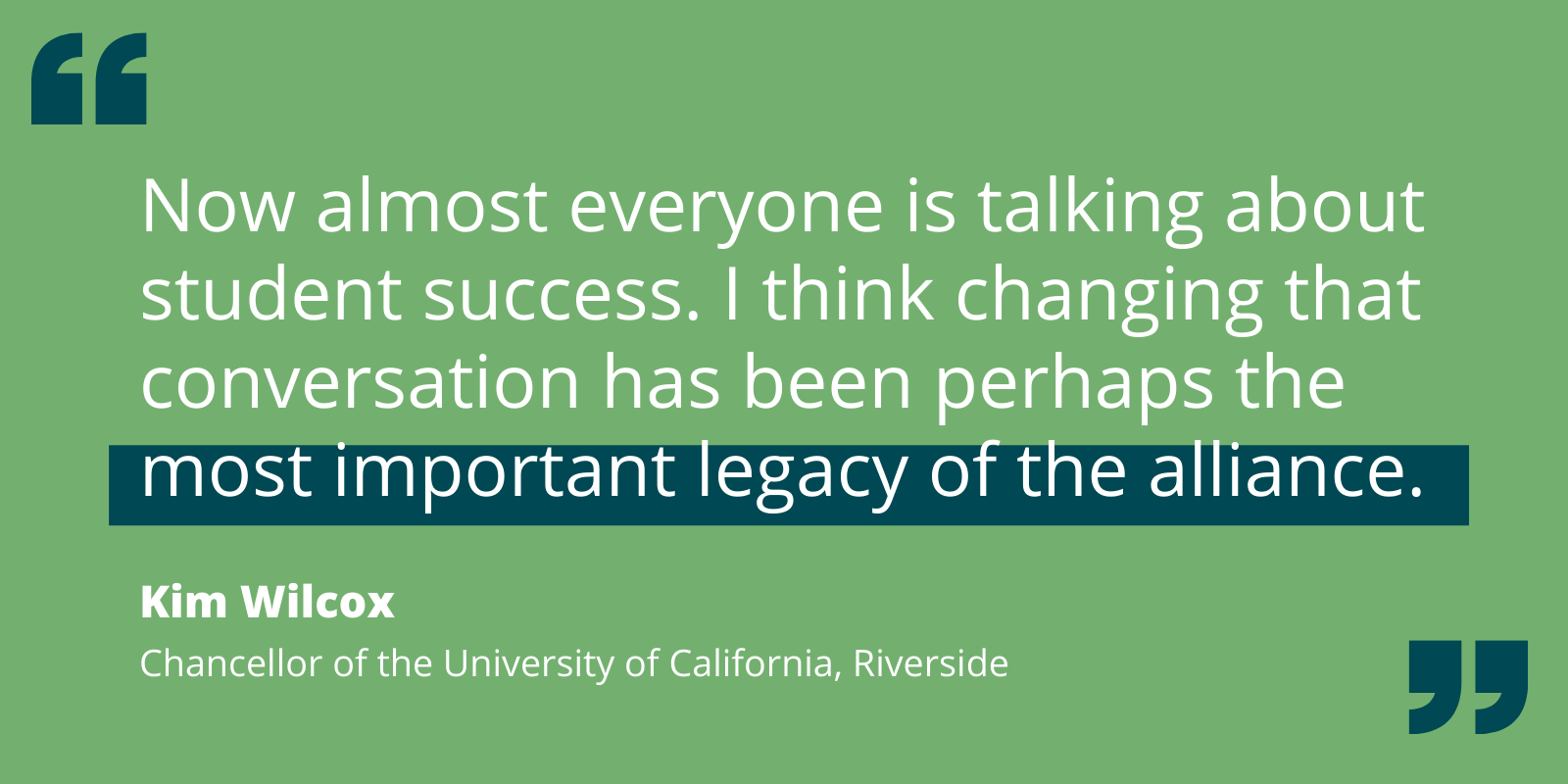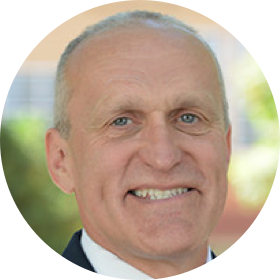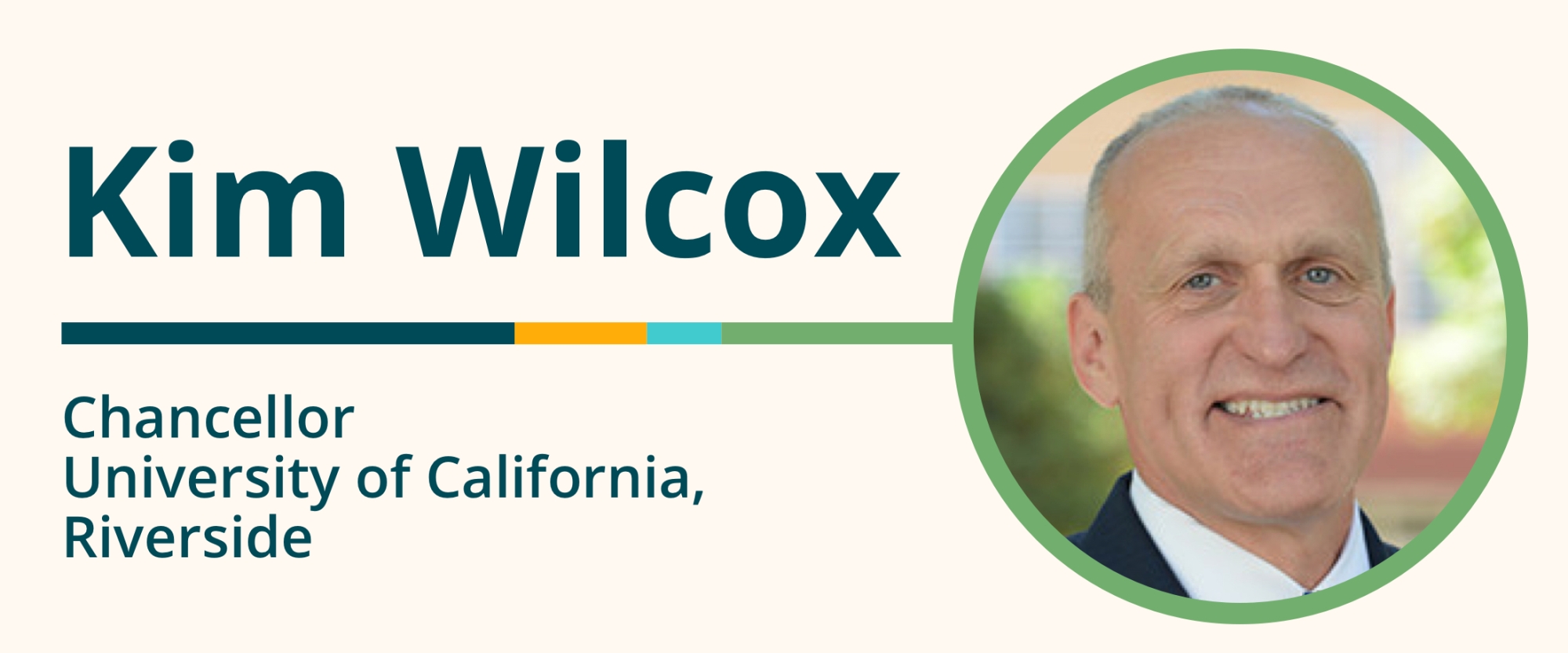We sat down with Dr. Kim Wilcox, Chancellor of the University of California, Riverside, to catch up after last year's conversation about reopening U.C.R. for fall quarter under challenging circumstances. This time, for our 7/19/21 podcast, Chancellor Wilcox returned to share his wisdom about the impact of alliances in higher education, the ideals and realities of collegiate athletics, and yet another surge in the COVID pandemic.
Additional UIA Results
Chancellor Wilcox has been integral in helping the UIA Board surpass our initial increased graduations goal four years ahead of schedule. He also reminded us about the alliance's other valuable outcomes.
"Number one is the visibility of the task," he began. "I'm proud that we came together eight years ago with a purpose of changing how universities think about their role. This isn't just about research dollars. There's something fundamental about student experience. Now almost everyone is talking about student success. I think changing that conversation has been perhaps the most important legacy of the alliance.

"The second piece," he continued, "is that we were the first time universities had come together for any purpose other than athletics. This was a group of universities who said what's important for us is making a difference to students that don't have the same resources as others. That was a fundamental commitment."
Chancellor Wilcox's third item speaks to the cultural change that we've fostered: "It's not just presidents and chancellors who meet and talk about student success. The 11 registrars know each other. Undergraduate deans talk to each other. There are colleague and support mechanisms to learn from and measure against. That change in local culture, I think, is a huge, huge benefit."
Impact of Alliances
We asked Chancellor Wilcox about the differences between organizations like the UIA and a statewide system like U.C.
"The University of California is by far the most homogenous system in the county," he said. "There isn't a clear flagship. They're all major research universities with huge enterprises and graduate programs. Student success is important. But so is managing medical centers, research enterprises, and the state budget. In the UIA's institutions, those are not an issue. Over cocktails, we can talk about them. But we can't be instrumental. So organizations bring a focus on a single topic. And I think that's a key piece.
"The other piece," he added, "when you think about A.T.I., or the A.P.L.U. and its Powered by Publics initiative, those are big groups. A meeting is several tables in a room. In UIA meetings, it's us around one table. I'm not saying one is better than the other. They're all part of what this last decade has been. But what is the right scale? If you're successful at a big scale, then that's a bigger impact. But how much harder is it, what's the value, and how focused can you be? So thinking about the frame is important."
Pandemic Challenges
One advantage of the U.C. system has been its fairly uniform statewide COVID policy. Chancellor Wilcox spoke about the two dynamics involved. "One is health, and the nuanced advice from the CDC has varied as we've learned more," he observed. "And the political overlay has only become more divisive over time, even in California where things look pretty good. Cal/OSHA has had different standards. The governor's office has changed. The Department of Health has changed. Riverside County adjoins Los Angeles County, which implemented a masking mandate this past Saturday at midnight. So even in a place that has some stability and some political leaning toward being conservative on health issues, there's still a lot of variation. And trying to find a way to impose the right expectations and then implement them all is a continuing challenge for every university president and chancellor in the country."
The ongoing uncertainty around COVID remains prevalent at U.C.R. "While everyone craves normalcy, we're all ready to accept quasi-normalcy," Chancellor Wilcox stated. "Even on the question of having to a wear a mask, people understand it in a different way than we did before. So I take a lot of heart. I do worry about shifts. Shifting everything online in March of 2020 was relatively easy, because it was black and white. This fall is more nuanced in terms of who has to work from home, who doesn't want to anymore, who wants to continue, which classes can. The decision-making and the communication with all these participants is the real challenge. We do best with black and white – gray looks different to every single person on campus, depending on their job and their class schedule."
Future of Athletics
In our previous conversation, Chancellor Wilcox mentioned that U.C.R.'s athletics department might feel deep budget cuts, a blow for any school with an NCAA Division 1 athletics program.
"We had a budget advisory committee," he recalled, "and one of their tentative recommendations was moving down a division, or maybe even eliminating athletics on the campus, something that wouldn't have happened to a Power Five school like Michigan State or Kansas. But we weathered that, we have a plan going forward, because I think athletics bring an awful lot to a campus community in terms of identity, spirit, and connection.
"The NCAA, 120 years ago, was an attempt to manage how out of control football had become among some schools in the East," he explained, "and we've tried to use that one instrument to manage all of athletics. That hasn't been very effective. So back to our discussion about the UIA and the ATI, what's the scale of management control going forward? Is it institution, conference, system, state? And more importantly, what do you want to accomplish?"
Chancellor Wilcox described his tenure on the president's forum for the NCAA, admitting, "I was the crank in the room who would repeatedly remind them that the mission statement is about developing students into future leaders, but very little of what you see the NCAA doing doesn't have to do with competitiveness and generating revenue. So it's a good time to have a calling of the question. Think about this. We accept coaches' rules and discipline in athletics. If we had a single professor who had class rules that they implemented on their own, we wouldn't tolerate it. Why is it we allow an entire culture to develop within our institution that is so different from the rest of the institution?"
This subject could easily turn into what Chancellor Wilcox called "a two-hour question."
Wisdom for Leaders
A favorite Weekly Wisdom moment is asking our guests about the best leadership advice that they've gotten and given.
"I've been so fortunate to have people who are willing to guide me," said Chancellor Wilcox. "Here's one I use a lot from my wife. Many years ago, I said, 'I don’t know if we can take a vacation.' Diane said, 'Kim, you need to take a vacation because everyone watches you. If you don't take a vacation, they think they shouldn't either.' That reminds you that your role is bigger than just doing your job and to think of people looking at you to know how to do things."
He shared two examples of advice that he likes to give. "When people ask, 'Who do you want to recruit?' I always say, 'I'm looking for somebody who is a good listener.' The best way you can learn is to listen, and be a thoughtful listener and a helpful respondent. And the other thing I remind people, 'It's not about you.' Never trust somebody who wanted to be a president in graduate school. They're doing it because they want to be in charge. Find a president or chancellor who never wanted to be a president or chancellor, and now they are, and they're generally doing it for the right reason."
Recommended Reading
We're big readers at the UIA, and we like to ask our guests for book recommendations.
"I read a lot of non-fiction," confessed Chancellor Wilcox. "I read a lot of biographies. I just re-read Up from Slavery, which is a great read in this time. A book that I would recommend for those in the academy is Lab Girl, a memoir of a biologist faculty member. So much of it resonates, I think, with people who have been on the faculty, graduate students and all the rest. There two other books I love. One is Boys in the Boat, the story of the University of Washington rowing crew team from the 1930s. And With the Old Breed was written by a faculty member at a university in Georgia. When World War II broke out, he quit college and enlisted in the Marines. He was a grunt through the South Pacific. And this book is a great way for me to look up at leadership rather than down, to think about leadership from a place that isn't leadership."
Note: This interview in the Weekly Wisdom Series originally aired on July 19, 2021 as part of the University Innovation Alliance’s Innovating Together Podcast, appearing live on Facebook, Twitter, and LinkedIn.
Links Mentioned in This Episode
• University of California, Riverside
• Four years ahead of schedule (UIA blog: "Innovating Together: Results From the University Innovation Alliance")
• Student success (UIA blog: "A System for Student Success: A Conversation With Tim Renick, Executive Director, National Institute for Student Success at Georgia State University")
• A.T.I. (American Talent Initiative, a collaboration of higher ed institutions to expand access and opportunity for lower-income students)
• A.P.L.U. (Association of Public and Land-Grant Universities)
• Powered by Publics (A.P.L.U.'s 125-institution initiative to improve college access, advance equity, and increase college degrees awarded)
• Cal/OSHA (California's Division of Occupational Safety and Health)
• Our previous conversation (UIA blog: "New Beginnings in a Pandemic Year: A Conversation With Kim Wilcox, Chancellor of the University of California, Riverside)
• NCAA Division 1 (subset of the National Collegiate Athletic Association)
• Power Five (top-level U.S. athletic conferences for college football)
• Up from Slavery by Booker T. Washington
• Lab Girl by Hope Jahren
• Boys in the Boat by Daniel James Brown
• With the Old Breed at Peleliu and Okinawa by Eugene Bondurant Sledge
Bios of Guest and Co-Hosts

Guest: Kim Wilcox, Chancellor, The University of California, Riverside
Dr. Kim A. Wilcox was appointed U.C. Riverside’s ninth chancellor in August 2013. He's overseen historic growth across U.C.R.'s education, research, and public service missions, including record improvements in student success, research funding, and philanthropic giving, as well as new schools of medicine and public policy. Chancellor Wilcox has grown faculty by nearly 25% while increasing its racial, ethnic, and gender diversity, and has guided the university toward becoming a national model for achieving student success across socioeconomic and ethnic categories. Under his leadership, U.C.R. became a charter member of the University Innovation Alliance. He has been an active participant on several higher education advisory boards and committees, including the NCAA Presidential Forum, the board of directors for the Coalition of Urban Serving Universities, and the Council on Competitiveness. Dr. Wilcox served as provost at Michigan State University from 2005 to 2013, dean of the University of Kansas' College of Liberal Arts and Sciences from 2002 to 2005, and president and C.E.O. of the Kansas Board of Regents from 1999 to 2002. He also spent ten years as the chair of the Department of Speech-Language-Hearing at the University of Kansas. A first-generation college graduate, Kim Wilcox earned a B.A. in audiology and speech sciences from Michigan State, and master’s and doctoral degrees in speech and hearing science from Purdue University. He has directed teaching, research, and service projects on speech acoustics funded by the National Science Foundation and the U.S. Department of Education.

Co-Host: Bridget Burns, Executive Director, University Innovation Alliance
Dr. Bridget Burns is the founding Executive Director of the University Innovation Alliance (UIA). For the past decade, she has advised university presidents, system chancellors, and state and federal policy leaders on strategies to expand access to higher education, address costs, and promote completion for students of all backgrounds. The UIA was developed during Bridget’s tenure as an American Council on Education (A.C.E.) Fellowship at Arizona State University. She held multiple roles within the Oregon University System, including serving as Chief of Staff and Senior Policy Advisor, where she won the national award for innovation in higher education government relations. She was a National Associate for the National Center for Public Policy and Higher Education, and has served on several statewide governing boards including ones governing higher education institutions, financial aid policy, and policy areas impacting children and families.

Co-Host: Doug Lederman, Editor and Co-Founder, Inside Higher Ed
Doug Lederman is editor and co-founder of Inside Higher Ed. With Scott Jaschik, he leads the site's editorial operations, overseeing news content, opinion pieces, career advice, blogs and other features. Doug speaks widely about higher education, including on C-Span and National Public Radio and at meetings and on campuses around the country. His work has appeared in The New York Times and USA Today, among other publications. Doug was managing editor of The Chronicle of Higher Education from 1999 to 2003, after working at The Chronicle since 1986 in a variety of roles. He has won three National Awards for Education Reporting from the Education Writers Association, including one for a 2009 series of Inside Higher Ed articles on college rankings. He began his career as a news clerk at The New York Times. He grew up in Shaker Heights, Ohio, and graduated in 1984 from Princeton University. Doug and his wife, Kate Scharff, live in Bethesda, MD.
About Weekly Wisdom
Weekly Wisdom is an event series that happens live on Facebook, Twitter, and LinkedIn. It also becomes a podcast episode. Every week, we join forces with Inside Higher Ed and talk with a sitting college president or chancellor about how they're specifically navigating the challenges of this moment. These conversations will be filled with practicable things you can do right now by unpacking how and why college leaders are making decisions within higher education. Hopefully, these episodes will also leave you with a sense of optimism and a bit of inspiration.
Rate, Review & Subscribe
Learn why hundreds of people have rated this new podcast 5 stars! Please join others and rate and review this podcast. This helps us reach and inform more people -- like you -- to help increase the number and diversity of college graduates in the United States.
Click here, scroll to the bottom, tap to rate with five stars, and select “Write a Review.” Then be sure to let us know what you loved most about the episode! Also, if you haven’t done so already, subscribe to the podcast. We’ll be adding a bunch of bonus episodes to the feed and, if you’re not subscribed, there’s a good chance you’ll miss out.

